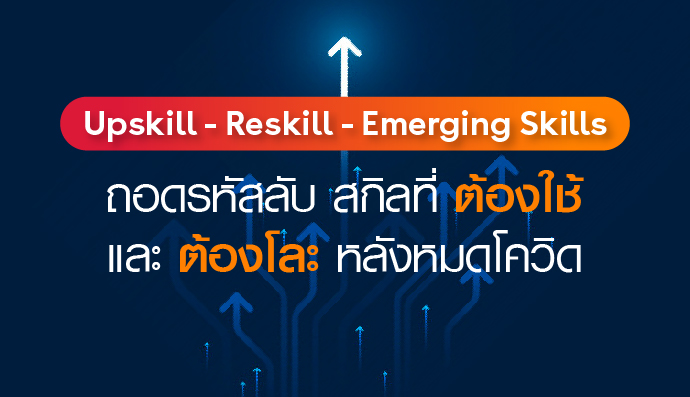- News and articles
- Events
- Find usIDP AustraliaIDP BahrainIDP BangladeshIDP CambodiaIDP CanadaIDP ChinaIDP EgyptIDP GhanaIDP Hong KongIDP IndiaIDP IndonesiaIDP IranIDP JordanIDP KenyaIDP KoreaIDP KuwaitIDP LebanonIDP MalaysiaIDP MauritiusIDP Middle EastIDP NepalIDP New ZealandIDP NigeriaIDP OmanIDP PakistanIDP PhilippinesIDP Saudi ArabiaIDP SingaporeIDP Sri LankaIDP Taiwan, ChinaIDP TurkeyIDP UAEIDP VietnamIDP Corporate
- Social
- English
Topics covered
- Published: 7 May 2024
- Updated: 29 December 2024
Essential Skills for Thriving in a Changing World
In today’s ever-evolving world, adapting to changes in the job market is vital. Two key strategies to ensure survival and success are Upskilling and Reskilling. These skills have become increasingly critical in the age of Digital Transformation, where most labor market demands revolve around digital capabilities.
What Are Upskilling and Reskilling?
Upskilling: The process of learning new skills to enhance one’s professional potential and keep up with the evolving demands of the job market.
Reskilling: The act of improving or refining existing skills to perform tasks more effectively or take on new responsibilities within a changing environment.
The importance of these strategies has become particularly evident since the onset of the COVID-19 pandemic, which has drastically altered lifestyles and behaviors worldwide.
Real-World Examples of Adaptation
Industries have had to pivot in response to these changes, with technology playing a pivotal role in their survival and growth. For instance:
Banking Sector: Banks have shifted from traditional services to digital-first solutions. Many branches closed, mobile banking apps were launched, and online transactions became the norm.
A standout example is Siam Commercial Bank (SCB) in Thailand, which diversified beyond finance into:
Media and Podcasts
Food delivery applications like Robinhood
Startup support through SCB10X
This showcases the need for innovation and adaptability to remain relevant in a disrupted landscape.
The Role of Innovation and Disruption
The modern workforce is driven by innovation and shaped by disruption. While technologies like AI and robotics continue to evolve, they are unlikely to completely replace humans anytime soon. As Elon Musk has noted, certain human attributes—such as trust and intuition—remain irreplaceable.
For example, imagine boarding a plane piloted remotely by an AI from someone’s home. While technically feasible, it would take years before such systems could fully replace human pilots due to trust and technological limitations.
Thus, the priority for individuals is to develop skills that enable them to control and manage these technologies rather than be replaced by them.
The Importance of Hard Skills and Soft Skills
Hard Skills: These are specialized, measurable skills necessary for specific professions, such as programming, data analysis, or accounting.
Soft Skills: These encompass emotional intelligence, creativity, teamwork, and leadership—qualities that technology and AI cannot replicate. Soft skills are the foundation for building relationships and driving organizational success.
Organizations today seek employees with a blend of hard and soft skills. While hard skills ensure competence in technical tasks, soft skills foster collaboration, innovation, and effective leadership.
Core Soft Skills Organizations Demand
To move forward, employees must possess:
Common Need, Common Vision, and Common Core Values: Shared goals that align individual and organizational ambitions.
Communication Skills: For clarity and understanding across teams.
Problem-Solving Skills: To address challenges effectively.
Leadership Skills: To inspire and guide others toward shared objectives.Post-COVID Essential Skills
The pandemic has accelerated the need for individuals to adapt and grow. Here’s how:
Mindset Shift:
Acknowledge what you don’t know and remain open to learning.
Embrace a growth mindset to continually improve.
Learning by Doing:
Classroom learning alone is insufficient. Practice and real-world application are necessary to refine skills and uncover new perspectives.
Adapt methods to suit specific situations since theory and practice often differ.
Consistent Evaluation:
Regularly measure learning outcomes and set clear standards for assessment.
Goal-Oriented Development:
Pursue skill enhancement with a defined purpose and intrinsic motivation.
A Future-Ready Workforce
To remain relevant and thrive, individuals must focus on both Reskilling and Upskilling while aligning their goals with market demands. By leveraging the power of both hard and soft skills, employees can contribute to their organizations' success and ensure their own professional growth in an ever-changing world.
Take the first step today—invest in your skills and unlock your potential for a brighter tomorrow!
One account for all your study abroad needs
Create your profile and unlock a wide array of features including personalised recommendations, fast-tracked applications and much more.
Search for articles
Dive into our extensive collection of articles by using our comprehensive topic search tool.















